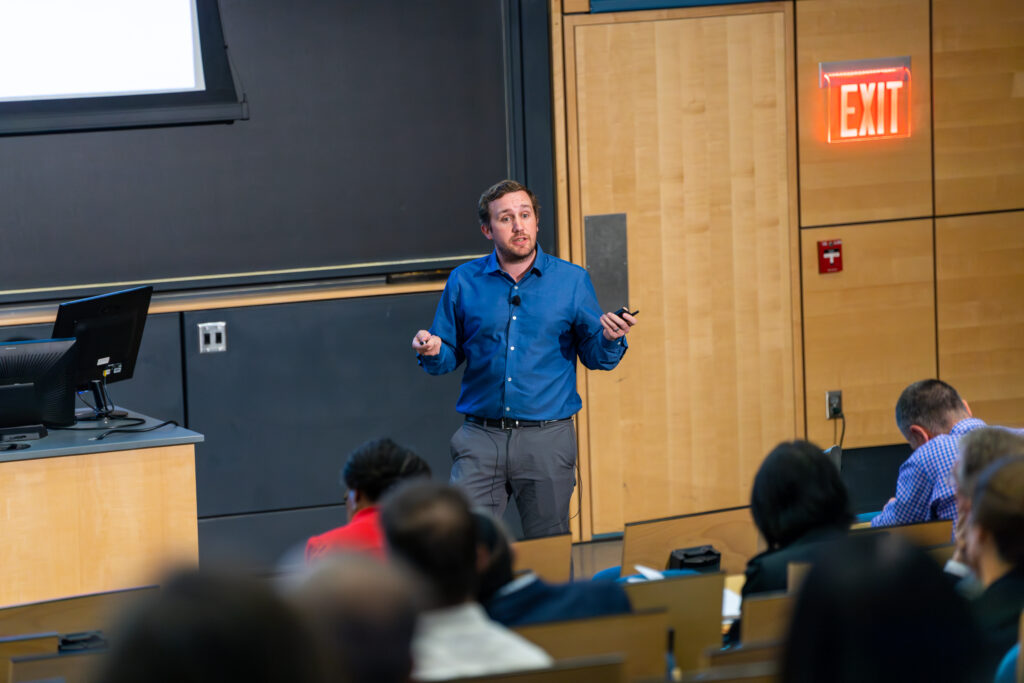Todd Hyster Joins Princeton Chemistry Faculty
The Department of Chemistry is pleased to welcome Todd Hyster as professor of chemistry.
Hyster rejoins Princeton’s faculty from his position as associate professor in the Department of Chemistry and Chemical Biology at Cornell University. He will reopen his lab here in the catalysis/synthesis subfield with a focus on new biocatalytic methods that address long-standing reactivity challenges in organic synthesis.
(Hyster was an assistant professor at Princeton from 2015 to 2020.)

Professor Todd Hyster presenting at the Princeton Catalysis Initiative Symposium in May.
“I’m incredibly excited to come back,” said Hyster. “There’s this energy at Princeton Chemistry that makes it feel like you can accomplish anything and that any research idea is possible. On the resources side, there is a world-class NMR, Mass Spec, and Biophysics facility in the basement at Frick at our fingertips. That allows you to design experiments and immediately validate your ideas.
“On the people side, it’s inspiring to be surrounded by academics who are at the peak of their fields. Princeton’s Department is filled with researchers who are the leaders in their areas.”
Hyster’s post was formally approved by the University Board of Trustees in a vote this week. His start date is July 1.
The Hyster Lab will continue to expand on the use light and new types of mechanisms with enzymes to do new transformations and solve challenges in synthetic organic chemistry that chemists have struggled to address for decades.
“We’re really excited about the opportunity to take the lessons we’ve learned in the past eight years and start to apply them broadly across a number of different enzyme families so we can exponentially grow the types of transformations available,” said Hyster. “I think this is going to have a big impact on chemical manufacturing—how we think about taking biomass and using it in completely new ways to build and degrade molecules.
“The other area we’re interested in is that some of this reactivity we’ve discovered can be applied to other types of problems, like understanding biological processes and understanding chemical biology more broadly. These are the directions that we’re really excited about.”
In Catalysis/Synthesis, Hyster joins a research subfield comprised of Paul Chirik, Edwards S. Sanford Professor of Chemistry; Professor of Chemistry Andrew Bocarsly; John Groves, who holds the Hugh Stott Taylor Chair of Chemistry; Professor of Chemistry Robert Knowles; James S. McDonnell Distinguished University Professor David MacMillan; Professor of Chemistry Martin Semmelhack; recent hire and Assistant Professor Jose Roque; recent hire and Assistant Professor Erin Stache; and Arthur Allan Patchett Professor in Organic Chemistry Erik Sorensen.
Hyster graduated with a B.S. in chemistry from the University of Minnesota in 2008 under Christopher Douglas. He did his Ph.D. work at Colorado State University with Tomislav Rovis. As part of his Ph.D. studies, he was a Marie Curie Fellow at the University of Basel with Thomas Ward. Hyster completed his postdoc at the California Institute of Technology with Frances Arnold, where he evolved P450s to catalyze nitrene transfer reactions.
Among other achievements, Hyster won a National Science Foundation CAREER Award in 2019, the Amgen Young Investigator Award in 2021, the Arthur C. Cope Early Career Scholar Award in 2022, and the National Fresenius Award this past spring.
Hyster grew up just south of Minneapolis, Minnesota. He is an avid golfer and, during the COVID lockdown, added the skill of home brewing to his list of hobbies.
